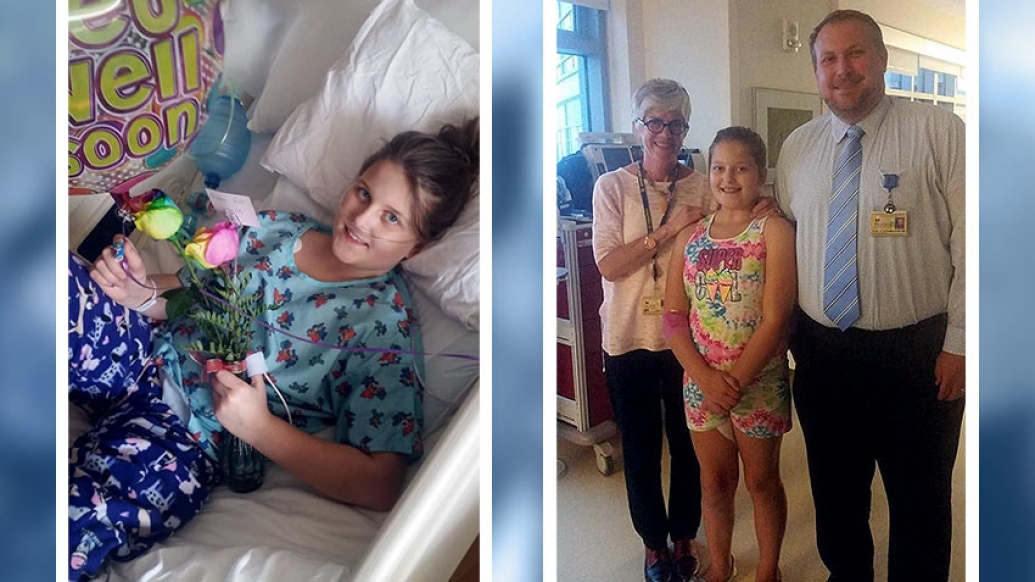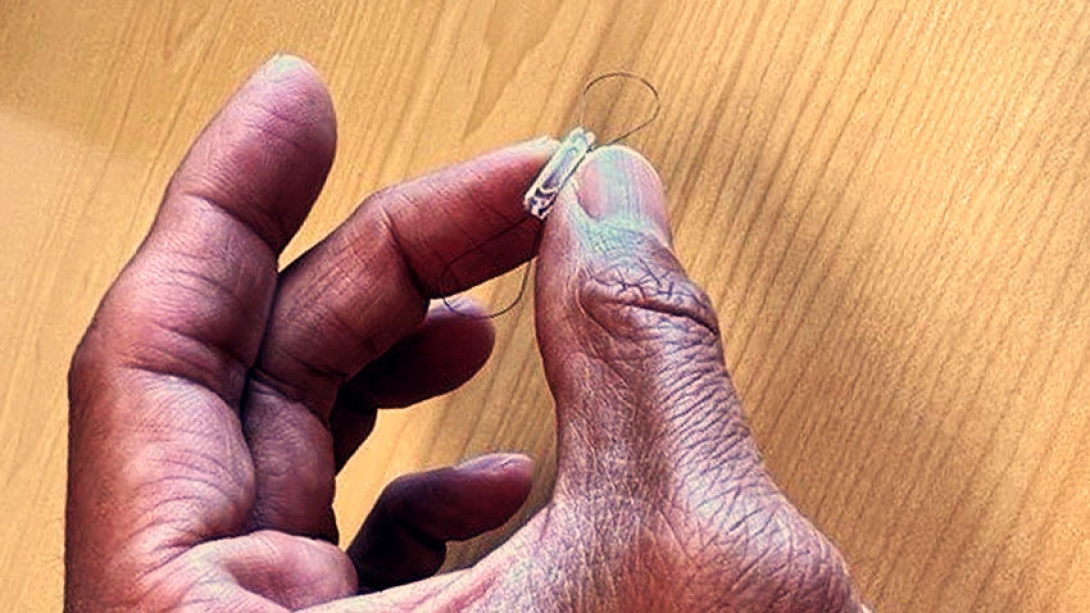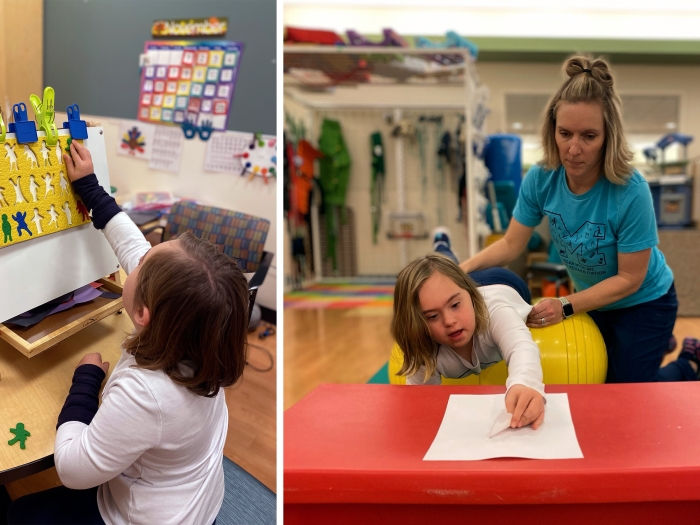Doctors implant paperclip-sized diagnostic device in the first pediatric patient in Michigan to allow close monitoring from afar, reduce risk of re-hospitalizations.
5:00 AM
Author |

Every night after dinner, 16-year-old Malea Hill lies down, presses a button and waits for 18 seconds – a new daily ritual to manage her rare and serious congenital heart disease.
While soft music plays, the portable pillow under her gleans information from a dime-sized, wireless sensor in her pulmonary artery and sends it to her congenital heart team at University of Michigan Health C.S. Mott Children's Hospital.
Now, instead of waiting for signs she's experiencing heart failure – that familiar shortness of breath, nausea and fatigue that have sent her to the hospital more than 10 times before – Malea can rely on this remote monitoring device to warn her something is wrong before she feels sick.
MORE FROM THE LAB: Subscribe to our weekly newsletter
The teen, who is currently being evaluated for a second heart transplant, is the first pediatric patient at U-M Health and in the state of Michigan to use the CardioMEMS, which Mott doctors implanted into her pulmonary artery in July. The tiny, battery-less diagnostic device allows her care team to proactively monitor her from afar and immediately adjust her medications if needed.
"You can't always tell Malea is getting sick just by looking at her," her mom Danielle Fricke said.
"By the time we know it's bad, she ends up being admitted to the hospital for days or weeks. Sometimes she needs to go under anesthesia for invasive procedures to know what's wrong. Sometimes she needs ICU care. This eliminates all of that. It's like a million bricks off our shoulders."
In and out of the hospital
Malea was born with dilated cardiomyopathy and left ventricular non-compaction cardiomyopathy, which prevents her heart from pumping blood through the body as efficiently as it should.
By age nine she needed a heart transplant. But her body showed signs of rejecting the heart, leading to several hospitalizations for heart failure and multiple biopsies and heart catheterizations over the next few years.
Then, in 2019, Malea experienced organ failure, spending three months – her entire summer before ninth grade – in the hospital, again, appearing to need another heart. But "miraculously," her mom said, Malea recovered months later and was taken off the transplant list.
Getting so sick and being immunocompromised meant being home schooled and missing milestones like starting high school and homecoming.
This is a completely novel use of the device for pediatric care at our center, and we hope to extend this use in children with various types of heart disease.David Ming-Shen Peng, MD
The curveballs just kept coming. By March of 2022 doctors found markers on Malea's bloodwork indicating antibody and cellular rejection to her transplanted heart – and she's now again being considered for a second heart transplant.
"Malea has had some big ups and downs in her heart journey and there's always been uncertainty about when she may need to be hospitalized for heart failure requiring intensive therapy," said David Peng, M.D., pediatric cardiologist and director of pediatric heart failure and mechanical circulatory support at the Mott congenital heart center.
"This device takes a lot of the guesswork out of the equation and helps us closely monitor her and potentially intervene before she feels sick," added Tiffany Hunter, lead pediatric heart failure registered nurse and ventricular assist device clinical care coordinator at Mott.
"Our hope is to keep patients like Malea feeling well and decrease the number clinical visits, invasive procedures and hospitalizations in the safest way possible."
Pulmonary artery pressure often starts to increase in heart failure patients one to three weeks before they notice symptoms. The CardioMEMS measures these changes in pressure to provide early warnings of disease progression before signs are noticeable.
The device has been used for adult heart patients at U-M Health for some time but Peng sees potential for further use in kids and teens.
"Children with heart failure are incredibly resilient and they often don't say or show how bad they are feeling. Many times, parents and doctors don't realize how severe their heart failure is until it is too late," he said. "The goal is to capture what's happening before they fall off that cliff.
"This is a completely novel use of the device for pediatric care at our center, and we hope to extend this use in children with various types of heart disease. It allows us to seamlessly adjust treatment and intervene earlier than we ever would before without the patient even coming in at all."

For Malea, who is in her senior year at high school in her hometown Taylor, the seconds long routine with the CardioMEMS also brings peace of mind. Hospitalizations are disruptive and she's experienced sepsis three times and chronic kidney failure due to heart failure episodes.
"Even regular people get out of breath or feel nauseous sometimes," she said. "With me, it's like 'why am I nauseous? Why am I out of breath? Is it my heart? Is it nothing?' Now I know they'll call me right away if something is wrong, which is such a good feeling. It relieves so much stress."
Looking forward to milestones
She says her U-M care team, including doctors, nurses and staff have always helped her through her hospitalizations and care, even during the worst times, inspiring her to someday pursue a career helping kids herself.
"I've had the best nurses and doctors and even the best janitors," she said. "They have the most uplifting personalities and kept me going even when I was really sick. I adore all of them."
"My heart issues do impact my life and my family's life and I have missed out on a lot of things because of it, but I think it's also made me a better person," she added. "I can't do everything other kids can do but I'm grateful for what I have."
If the CardioMEMS is able to help her team keep her out of the hospital, Malea plans to spend as much as time as possible with her siblings, which include older sister and "best friend" Cierra and brother Shane along with younger siblings Isaac, Jada, Laines, James and Alizabeth who she refers to as "my babies who I love so much."
Also on the list: enjoying outdoor activities, shopping trips and cooking for her family. This year, she's most looking forward to prom and high school graduation.
"With everything she's gone through, she is one of the strongest people I know," Fricke said.
"We are extremely grateful to her doctors and nurses at U-M and everything they do to make sure she's getting the most advanced and best care to make living her life easier. It makes a huge difference."
Like Podcasts? Add the Michigan Medicine News Break on iTunes or anywhere you listen to podcasts.

Explore a variety of healthcare news & stories by visiting the Health Lab home page for more articles.

Department of Communication at Michigan Medicine
Want top health & research news weekly? Sign up for Health Lab’s newsletters today!





